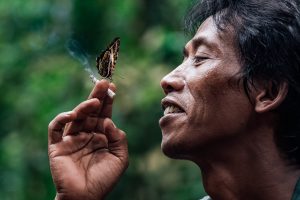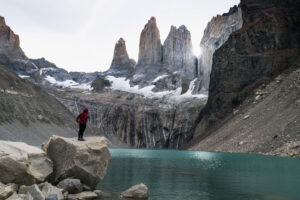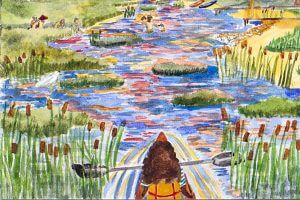I was surrounded by stacks of cash.
The mandala of money fanned out farther than I could reach. My fingers became sootier and smoother as I counted out note after note after note, and bundle after bundle after bundle.
Rina, my new friend, sat barefoot next to me, amidst piles of sequined fabrics in pink, red, turquoise, silver, and gold. She was adding up bills in front of her slim, tattooed, silver-bell-adorned ankle, laughing and smiling as she checked my work.
She knew I couldn’t be trusted.
~~
Two days earlier, I followed the Ganges and the tap tap tap of Pappu’s wooden cane as the faint smell of fire whirled around the warren of the old city of Varanasi, India. Pappu, my guide for the morning, was in his mid-20s, but his pace had been muted by a motorcycle crash six months before. I didn’t mind. The slow speed matched my mood.
We dodged a river of mud and the thick yellow hose running over it. We chatted about life, our families, and the foggy weather. Pappu explained through milky eyes and a thin smile how energy and the cycle of life ebbed and flowed in Varanasi.
We all have this problem. It is everyone’s problem.
“This is where I grew up,” he said, placing his hand on his white and burgundy, 70s-era puffy jacket, as we arrived at his house.
We walked up two flights of dim, narrow stairs, and arrived at a patio with bright orange chairs. Pappu started rolling a joint on the matching bright orange plastic table.
I thought about asking him for a toke, but decided I had enough problems already.
“I don’t know what to do!” I said. “How will I get money?”
“You have to trust,” he said, looking up and pointing his joint to the clouds. He blew smoke rings across the bright white patio as dance music bounced across the rooftops. “We all have this problem. It is everyone’s problem.”
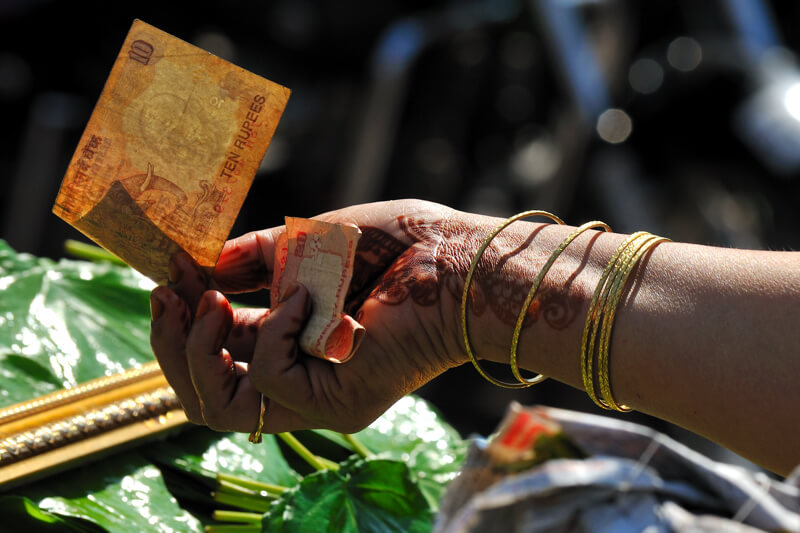
Rupees in hand, a woman pays for goods at a market in India. PHOTO: DAN ROMEO.
I left Pappu and sat at a communal wooden table with three others at a popular travelers’ spot called Open Hand Cafe. I was staring at my notebook, not knowing what to write. Not knowing what to do. Not knowing anything but that I wanted to curl up in my bed at home in San Francisco.
I had spent the last of my cash.
A Korean woman across from me was creating a macramé necklace from turquoise cord and an opal-like stone. She laughed with two Korean men as slices of cheesecake and mugs of steaming tea were placed in front of them.
I looked away. I wanted to cry.
I looked back.
She smiled.
“Your necklace is so pretty,” I said, and began to ask about her life.
Rina was a jewelry designer and exporter who had lived in Pushkar, about 600 miles west of Varanasi, for the last year. She and her two friends, Youn, and Roh, were solo travelers like me. They had all met on the overnight train from Jaipur to Varanasi three days earlier.
Rina, Roh, and Youn invited me to dinner at a Korean restaurant and we walked along the ghats — the walkways leading to the Ganges — on the same path I’d taken with Pappu.
We sat at a low table eating Bibimbap and taking selfies and then went outside to drink ginger tea from tiny glasses along the river at Rina’s favorite chai stand.
The river where marigold-filled rituals of death, and birth, and devotion were performed at dawn and dusk was dark and still, except for sparkly lights bounding across it and children riding by it on bicycles. The four of us were dangling our legs over the path that led to the water and I asked my new friends a favor — would they help me find the main post office in the morning?
“I will then buy tea and cheesecake for everyone!” I promised.
The post office was my last option.
~~
I needed cash. From Mumbai to Delhi to Aurangabad to Varanasi, I had spent countless hours over the last several days waiting in lines at crowded ATMs, getting lost in the dark searching for ATMs that were barricaded behind metal gates, and putting my debit card into dozens of empty ATMs.
I was tired of picking at food created for Western palates at hotels — one of the few places where I could spend money with my foreign cards. I was sad that when I saw children begging under a freeway overpass in Aurangabad, that I truly had no money to give. I thought a lot about gratitude, and my privilege in the world to even be traveling in India, but at the same time I felt lost and alone. I was not sure how I could write about India with no funds to experience its sites, and flavors, and cities.
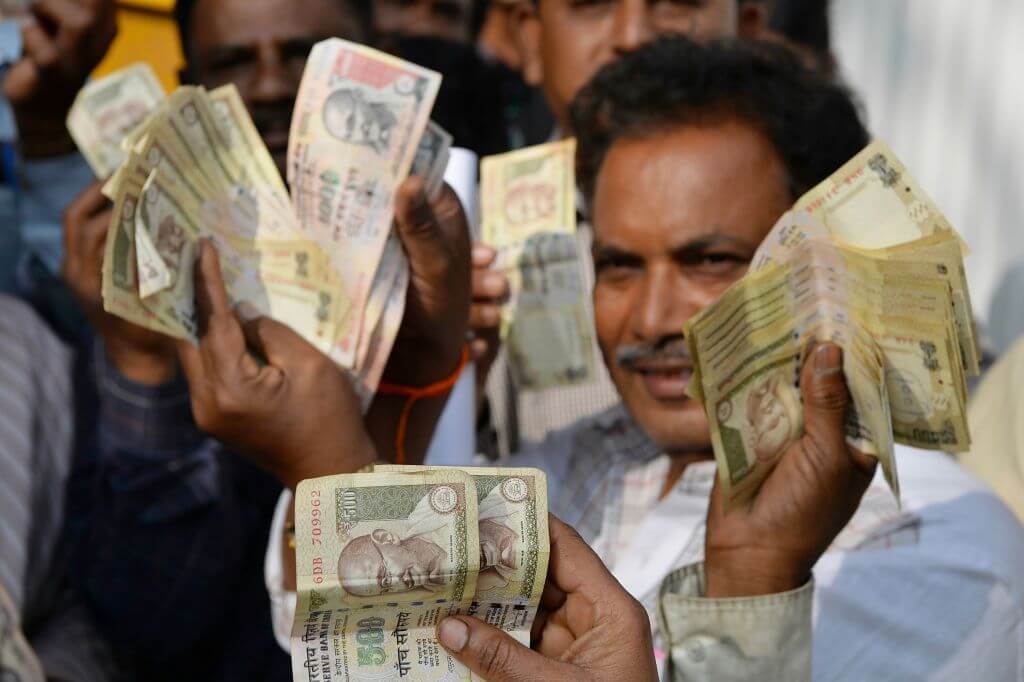
People waiting to exchange demonitized Indian currency, show their old 500 and 1000 Rupee notes near the closed gates of Reserve Bank of India in Bangalore. PHOTO: MANJUNATH KIRAN/AFP/GETTY IMAGES.
It was November 2016, and Indian Prime Minister Narendra Modi had given four hours notice before making 500 and 1,000 rupee notes obsolete. It was an effort to eradicate illegal cash that had turned the most widely-used bills in the country’s cash-driven economy into Monopoly money overnight.
India Rupee Crisis: Tourists Struggle Without Cash
Indian Cash Crisis Deepens as ATMs Run Out of Money
Cash Chaos After Shock Move Targeting India’s “Black Money”
The headlines were true, but could not begin to convey how it would feel to live them.
People were scrambling to banks and ATMs to trade old notes for new 2,000 and 5,000 ones. Even with a withdrawal cap of 4,000 rupees a day, there were too many people who needed cash and the machines could not keep up with the demand.
It truly was everyone’s problem.
I had seen dozens of Western Union signs hanging next to clumps of electrical wires on soot-covered buildings in Varanasi, and had decided that placing a Western Union order was the solution to my problem. During my walking tour with Pappu, I had asked him which Western Union agent would have cash. He wasn’t sure, so we went to one inside a family-friend’s curio shop.
“No cash,” the bearded man said. “Try the post office tomorrow morning.”
~~
Rina, Youn, and Roh sat on plastic chairs behind me at the post office, and waited.
A money man, who sat behind a counter framed by dark-wood paneling and rows of empty shelves, said that I needed an Indian cell phone number. Roh let me use his. Then the money man said that he couldn’t give me the money because my middle name appeared on my passport, but only my first and last name appeared on the Western Union order.
“It’s me! It’s me,” I said, showing him an email on my mobile phone with the order. “It’s really me.”
“Ok,” the money man said. “But I only have 10 rupee notes.”
I was not then, nor have I ever, been good at math.
“Ok, no problem,” I said, and signed the pink slip of paper for the order.
The money man raised his left eyebrow.
He walked around from the counter to lead me to another room down a hallway. I exchanged hopeful looks with Rina, Youn, and Roh.
A man behind white bars in a coat-closet-sized room took the slip of paper from the money man. He turned to mounds of rice bags that were filled with rubber-banded rupees, and began to stack the currency on a counter outside the barred room.
The stacks grew, and grew, and grew.
I was not then, nor have I ever, been good at math.
10 rupees? 10 rupees! 10 rupeeeeeessss! My eyes grew wide and I braced myself on the counter.
The U.S. Dollar to Rupee exchange rate was about 60 to 1, and I’d asked for $300 worth of rupees.
I rested my palm on my forehead, and closed my eyes as the men stacked and tidied the multiplying bundles of worn cash before me.
The money man and the man behind the counter smiled and chuckled. I did not make eye contact.
I was presented with seven-inch stacks of rubber-banded 10 rupee notes, totaling about 2,000 bills, or 19,000 rupees. Looking closely, I could see that there were stacks within the stacks.
The men pointed me to pink slips of paper on each big stack and in the mini stacks, showing that the rupees had been counted by the government on a certain date.
Oh, as if it even matters.
“Do you have a bag?” I asked the man behind the counter.
“No. No bag,” he said, smiling.
I closed my eyes and took a deep breath.
I dumped the contents of my purse — sweater, Kindle, notebooks, pens, mobile phone, passport, DSLR camera, sunglasses, and wallet — on the counter next to the rupees. As I did it, I looked over my shoulder to see if anyone was watching.
I smashed the stacks down into my bag. They barely fit. I slowly zipped the purse closed and slung its strap over my shoulder. Holding my belongings in my armpit and cradling the purse like a newborn, I hobbled over to Rina, Youn, and Roh.
“Can I put my things in your backpack?” I asked Roh, handing him everything from the purse. “Now, I have a new problem.”
I slowly unzipped my bag, and my new friends erupted into laughter.
~~
We crowded into a rickshaw headed for Open Hand Cafe as I clutched the bag of cash to my chest.
Then, I made good on my promise and bought everyone cheesecake.
I was worried, but I trusted that my friends — who had been strangers to me the day before — would help me find a way to solve this.
I was flying from Varanasi to Delhi the next day and was nervous about going through security with a bag full of cash. I wasn’t sure if the rupees would even fit in my backpack.
Could I trade the cash at banks? Tourist offices? Another Western Union? We discussed the different scenarios. I had no idea what I was going to do.
Rina had a solution.
“Shops will be happy to have 10 rupees for change,” Rina said, reasoning that people would trade their crisp 2,000 and 5,000 rupee notes for my 10s.
She had lived in Varanasi for several months during the previous year as part of her export/import business, and offered to take me to owners who she trusted.
“You are safe with us,” she said.
We had a plan: Rina would make the pitch, Youn and Roh would stand with me for safety, and then I would reveal the rupees. We started with Open Hand Cafe.
“Do you need 10 rupees?” Rina asked.
“How many?”
“As many as you want.”
And just like that, 2,000 rupees were gone.
I owed Pappu money for his guiding — and so went another 3,100 rupees as he chuckled, telling me he knew it would all work out. My bag began to lighten and I felt some relief.
Youn and Roh bought cigarettes at another shop — where I traded 200 — and then they went off to drink whiskey.
Rina and I continued.
~~
We took off our shoes and sat cross-legged on the white-cushioned floor of the fabric shop, surrounded by bangles and bright fabrics and wall tapestries.
I hesitantly unzipped my bag.
“Wow! Oh my god!” the owner — another friend of Rina’s — said, slapping his forehead and bursting into laughter.
A shopkeeper next door popped in to see what the commotion was.
Rina’s friend agreed to trade 5,000 rupees that night and 2,000 the next morning. But he didn’t trust the slips of paper from the post office, so we counted — first me, then Rina.
As we worked, Rina asked another shop owner who stopped by if he wanted to trade any. He wanted 2,000.
We kept counting.
With more than two-thirds of the rupees gone, we headed for Rina’s favorite chai stand.
Satisfied with our work, we drank tea. Then Roh and Youn and a neighborhood dog joined us for selfies on the Ganges.
~~
The next morning, I paid my hotel bill in 10s. I was down to my last 2,200 and 2,000 would be gone after Rina and I returned to the fabric shop for the last trade.
Rina and I met Roh and Youn at a cafe for one more breakfast before my flight, and I put the last 200 rupees worth of 10 rupee notes on the table to pay for everyone. By now, my wallet was filled with only 2,000 and 5,000 notes acquired in trade.
We had only known each other for three days, but my throat was heavy and I cried as I hugged them goodbye, promising that we would see each other again, and knowing that we might not.
It was as Pappu had said when he was looking up at the clouds: I had to trust. In my four days in Varanasi, I had witnessed a kind of miracle — one that started with a smile from a stranger.
Liz Shemaria
Liz Shemaria is a founding editor at Hidden Compass, an award-winning journalist, and a third-generation Northern Californian who has trekked solo in the Himalaya, interviewed artists in military-ruled Burma, and rode an overnight train across Egypt on her birthday.

